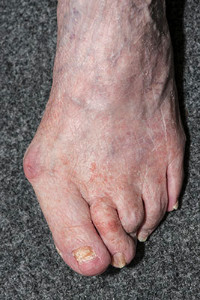 Improper footwear is one of the leading causes of bunion development. Women are ten times more likely to have bunions compared to men, and the fact that they tend to wear high heels and narrow shoes only makes their bunion problems worse. Another cause of bunions can be genetics. Foot shape and structure are hereditary traits, and some foot shapes are more prone to bunion development than others. Some risk factors include having flat feet, low arches, and loose joints.
Improper footwear is one of the leading causes of bunion development. Women are ten times more likely to have bunions compared to men, and the fact that they tend to wear high heels and narrow shoes only makes their bunion problems worse. Another cause of bunions can be genetics. Foot shape and structure are hereditary traits, and some foot shapes are more prone to bunion development than others. Some risk factors include having flat feet, low arches, and loose joints.
If you are suffering from bunions, contact one of our podiatrists of Sutera and Jones Surgical Podiatry. Our doctors can provide the care you need to keep you pain-free and on your feet.
What Is a Bunion?
A bunion is formed of swollen tissue or an enlargement of boney growth, usually located at the base joint of the toe that connects to the foot. The swelling occurs due to the bones in the big toe shifting inward, which impacts the other toes of the foot. This causes the area around the base of the big toe to become inflamed and painful.
Why Do Bunions Form?
Genetics – Susceptibility to bunions are often hereditary
Stress on the feet – Poorly fitted and uncomfortable footwear that places stress on feet, such as heels, can worsen existing bunions
How Are Bunions Diagnosed?
Doctors often perform two tests – blood tests and x-rays – when trying to diagnose bunions, especially in the early stages of development. Blood tests help determine if the foot pain is being caused by something else, such as arthritis, while x-rays provide a clear picture of your bone structure to your doctor.
How Are Bunions Treated?
- Refrain from wearing heels or similar shoes that cause discomfort
- Select wider shoes that can provide more comfort and reduce pain
- Anti-inflammatory and pain management drugs
- Orthotics or foot inserts
- Surgery
If you have any questions, please feel free to contact one of our offices located in Media and Glen Mills, PA . We offer the newest diagnostic and treatment technologies for all your foot care needs.
Read more about Bunions